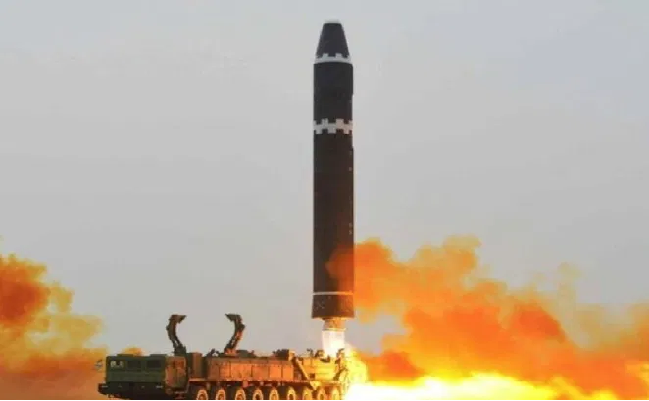.gif)
.gif)

North Korea said on Sunday it had tested an intercontinental ballistic missile as a warning to Washington and Seoul, saying the successful "surprise" exercise demonstrated Pyongyang's "capability for a fatal nuclear counterattack."
Leader Kim Jong Un ordered a "sudden launch drill" at 8:00 a.m. (23:00 GMT) on Saturday and a Hwasong-15 missile - a weapon first tested by the North in 2017 - was fired from Pyongyang Airport in the afternoon, official KCNA said. South Korea's military said it detected an ICBM launch at 5:22 p.m. (0822 GMT) on Saturday, which Japan said flew for 66 minutes before entering its exclusive economic zone, with their analysis suggesting it was capable of hitting the United States mainland.
North Korea's leadership welcomed the test — the country's first in seven weeks — and said it showed "the real war-fighting capability of ICBM units that are ready for a mobile and powerful counterattack," KCNA said. The launch was "real proof" of the country's "capability of a fatal nuclear counterattack against enemy forces," he added. The start of the lifting of sanctions came just days before Seoul and Washington begin joint table-top exercises aimed at improving their response in the event of a North Korean nuclear attack.
Pyongyang last week warned of an "unprecedentedly" strong response to the upcoming US-South Korean drills, which it describes as preparations for war and blames the deteriorating security situation on the Korean peninsula..Saturday's test is significant because "the event was scheduled for a day, so it's not so much a traditional 'test' as an exercise," US analyst Ankit Panda told in a report. "We should expect more exercises of this kind," he added.
Yang Moo-jin, a professor at the University of North Korean Studies in Seoul, said the test showed Pyongyang was "equipped with a system capable of launching even a liquid-fueled ICBM in less than half a day on unannounced orders without prior planning." He warned that the security situation on the peninsula now looks set to deteriorate further in the next few months "as South Korea and the US are expected to continue their joint training plan and North Korea ... will take a tough response". Relations between the two Koreas are already at one of their lowest points in years after North Korea declared itself an "irreversible" nuclear state and leader Kim called for an "exponential" increase in weapons production, including tactical nuclear weapons.
In response, South Korean President Yoon Suk Yeol has sought to strengthen cooperation with key security ally America, pledging to expand joint military exercises and improve Washington's so-called extended deterrence offer, including nuclear assets. On Sunday, North Korea's spokeswoman and Kim's sister, Kim Yo Jong, claimed that these very actions by Seoul and Washington are "every moment further threatening the situation and destroying the stability of the region," according to a KCNA report.
"What's different from 2022 is that last year their rationale was that the launches were part of their five-year military plan," he said. "Now they are making it clear that they will face the United States and South Korea," Park said. He said the doubling down on aggression from Pyongyang may also indicate that the domestic situation has worsened. South Korean officials recently warned that the country could face severe food shortages after years of isolation linked to the pandemic.